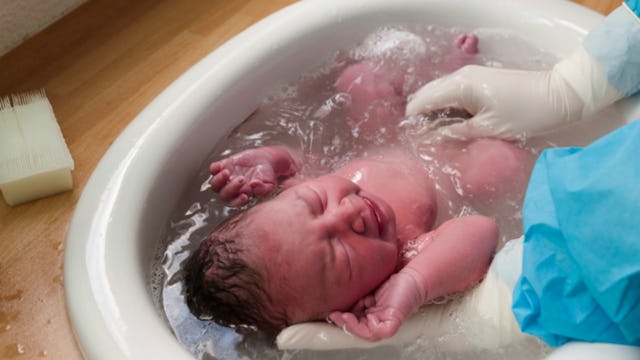How A Baby's First Bath Can Impact Breastfeeding

Soon after my first baby was born, he was quickly whisked off to be bathed and for his newborn tests. I remember when my midwives handed him to me, all wrapped up in a cozy towel, looking clean and absolutely dapper.
All seemed well, but when it came time to feed, my little guy was totally uninterested in my boobs. By that point, he had been through a lot and basically just wanted to sleep. And thus began a very traumatic few days where I had to hand express my milk around the clock, feed it to him by spoon, and beg my reluctant, non-latching baby to breastfeed. I’ll never forget how painful those first few days were.
My son eventually did figure out how to nurse, but when my second son was born, I decided that I needed to do things differently. We did skin to skin right after he was born, and I watched him crawl to the breast on his own, and latch right on!
It was amazing, he nursed like a champ from the get-go, and he pretty much didn’t leave my chest for the first 24 hours. All of his tests were done while he was on me, and we ended up delaying his bath until a day or two later (no, it wasn’t THAT gross; we did a little spot-cleaning here and there).
Well, it turns out I was on to something. Delaying a newborn bath – a practice already recommended by The World Health Organization (WHO) – really can have tangible benefits for babies, especially when it comes to breastfeeding. Take this new study recently published in the Journal for Obstetrics, Gynecologic, and Neonatal Nursing, which found a direct correlation between the delaying of a baby’s first bath, and an increased rate of breastfeeding initiation.
The research team followed almost 1,000 moms from Cleveland Clinic Hillcrest Hospital to study how bathing affected their breastfeeding rates. 448 babies were bathed soon after birth, and 548 had their baths delayed for 12 hours.
Here’s what they found: breastfeeding rates increased from 59.9% to 68.2% among the babies who’d had their baths delayed. In addition, babies in the delayed bathing group were also more likely to have post-discharge feeding plans that included breastfeeding.
So why the connection between delayed bathing and increased breastfeeding? The researchers think it might have a little something to do with the amniotic fluid that remains on the baby if you don’t bathe them, citing a study from 2013 that found that the fatty acids in amniotic fluid may act as a “sensory cue” that helps guide babies to the breast.
“Babies spend nearly 40 weeks swimming in amniotic fluid,” Heather DiCioccio, one of the study’s researchers, tells Scary Mommy. “There is some thought that the smell of the amniotic fluid is similar to the smell that the mother’s breast have, making it easier for the newborn to find the breast for feeding. Not bathing the baby so soon may keep those similar smells there, making latching easier for the mother-baby couplet.”
Totally and completely fascinating, amirght?
Another factor may have something to do with temperature regulation. The researchers found that babies who had been given a bath right away had less normal or stabilized temperatures, which may have had an impact on breastfeeding.
“We do know that the mother’s body can sense whether the baby is cold or warm (when skin-to-skin) and that her body will adjust to meet the needs of her baby,” said DiCioccio, who added that skin to skin time in general is a key component to breastfeeding success — and is so valuable in general for moms, babies, and their partners.
“Not bathing the baby so soon after birth may lead to an increase in time spent skin-to-skin with the mother or other caregiver,” she explained. “We hope that this increase in time spent skin-to-skin will lead to an improvement in breastfeeding rates as it allows the mother and baby to learn about each other.”
Now, if you are on the fence about waiting a whole 12 or 24 hours to bath your baby, DiCioccio says that even delaying by just a few hours can be helpful.
“While this is the current policy on our unit, we still respect the wishes of the mother/family,” she says. “If we have a family that is refusing to delay the initial bath after discussing the potential benefits, we will bathe closer to 2 hours of life or longer to allow the newborn a chance to stabilize.”
Indeed, just a two-hour delay can have real benefits, according to the The Association of Women’s Health, Obstetric and Neonatal Nurses, which also found decreased rates of hypoglycemia among babies whose baths were delayed.
Like I said, if the “ewwww” factor is a thing for you, you can totally just spot-clean your baby, or wipe them down with a towel. But the idea that they need to be taken away from your warm skin and bathed immediately just might not be the best practice any longer.
So if you are due with another baby, consider telling your healthcare providers that you’d like to hold off on the bath. Delaying the newborn bath is good for babies, good for moms – and if breastfeeding is your goal, delaying that bath could have a huge impact.
This article was originally published on